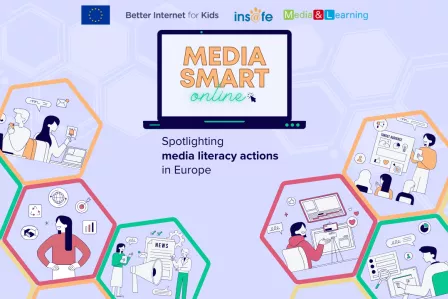
Media literacy in Europe is characterised by being a rather diverse and somewhat fragmented area of interest with a wide variety of different players involved ranging from supra-national agencies to national and regional policymakers, NGOs, educational providers and media and industry players. When it comes to actual initiatives, these generally fall into one of the following categories: projects,
actions, programmes and campaigns, varying in terms of the type of intervention that is proposed, the scale and target of those for whom it is intended, and the duration and goal.
A lack of a common understanding and agreement as to what constitutes media literacy and the extent to which it is synonymous with media education, information and digital literacy, adds further complexity. Interest in media literacy is on the rise, largely due to increasing concerns regarding disinformation which, many argue, is posing a direct threat to our democratic way of life.
Mapping of the media literacy landscape in the context of Better Internet for Kids
UPDATED! A new version of this mapping was published in June 2025, and this version therefore acts as an update and expansion of the previous version (published in February 2024).
A revision and expansion of the material was conducted in 2025, resulting in an updated version of the mapping. Similar to the previous version, this analysis of the current digital and media literacy initiatives was carried out in cooperation with the Media & Learning Association (MLA).
Read and download the full mapping of the current EU media literacy landscape (updated).
First version of the mapping
A first iteration of the mapping was published in February 2024, summarising media literacy current important activities, key organisations and driving factors – all in the context of the Better Internet for Kids initiative. This analysis was carried out in cooperation with the Media & Learning Association (MLA).
Read and download the first mapping of the current EU media literacy landscape.
Please note that, as part of this mapping exercise, the Insafe network of Safer Internet Centres was consulted. In September 2023, Better Internet for Kids conducted a survey to map the current EU media literacy initiatives among the network, and collect suggestions on priorities for an EU-wide media literacy campaign. More specifically, the survey asked SICs about their current media literacy actions, campaigns, and key partners, and specifically requested to evaluate the current status of media literacy education within the Safer Internet Centre’s work programme. 19 SICs answered the survey – and a majority noted media literacy education as a “high priority”. The SICs were also asked to state how they currently deliver any media literacy-related activities, and to point out any additional media literacy programmes or campaigns in their countries, even if not managed or organised by them. They were also asked to provide suggestion for conducting an EU-wide media literacy campaign.
More about MediaSmartOnline

Media literacy in Europe is characterised by being a rather diverse and somewhat fragmented area of interest with a wide variety of different players involved ranging from supra-national agencies to national and regional policymakers, NGOs, educational providers and media and industry players. When it comes to actual initiatives, these generally fall into one of the following categories: projects,
actions, programmes and campaigns, varying in terms of the type of intervention that is proposed, the scale and target of those for whom it is intended, and the duration and goal.
A lack of a common understanding and agreement as to what constitutes media literacy and the extent to which it is synonymous with media education, information and digital literacy, adds further complexity. Interest in media literacy is on the rise, largely due to increasing concerns regarding disinformation which, many argue, is posing a direct threat to our democratic way of life.
Mapping of the media literacy landscape in the context of Better Internet for Kids
UPDATED! A new version of this mapping was published in June 2025, and this version therefore acts as an update and expansion of the previous version (published in February 2024).
A revision and expansion of the material was conducted in 2025, resulting in an updated version of the mapping. Similar to the previous version, this analysis of the current digital and media literacy initiatives was carried out in cooperation with the Media & Learning Association (MLA).
Read and download the full mapping of the current EU media literacy landscape (updated).
First version of the mapping
A first iteration of the mapping was published in February 2024, summarising media literacy current important activities, key organisations and driving factors – all in the context of the Better Internet for Kids initiative. This analysis was carried out in cooperation with the Media & Learning Association (MLA).
Read and download the first mapping of the current EU media literacy landscape.
Please note that, as part of this mapping exercise, the Insafe network of Safer Internet Centres was consulted. In September 2023, Better Internet for Kids conducted a survey to map the current EU media literacy initiatives among the network, and collect suggestions on priorities for an EU-wide media literacy campaign. More specifically, the survey asked SICs about their current media literacy actions, campaigns, and key partners, and specifically requested to evaluate the current status of media literacy education within the Safer Internet Centre’s work programme. 19 SICs answered the survey – and a majority noted media literacy education as a “high priority”. The SICs were also asked to state how they currently deliver any media literacy-related activities, and to point out any additional media literacy programmes or campaigns in their countries, even if not managed or organised by them. They were also asked to provide suggestion for conducting an EU-wide media literacy campaign.
More about MediaSmartOnline
- media education media literacy MediaSmartOnline











